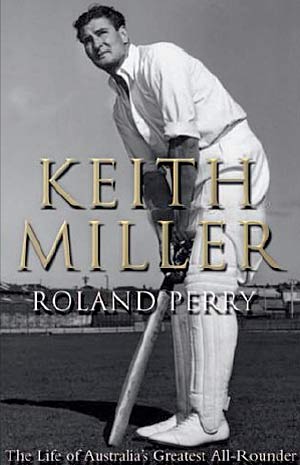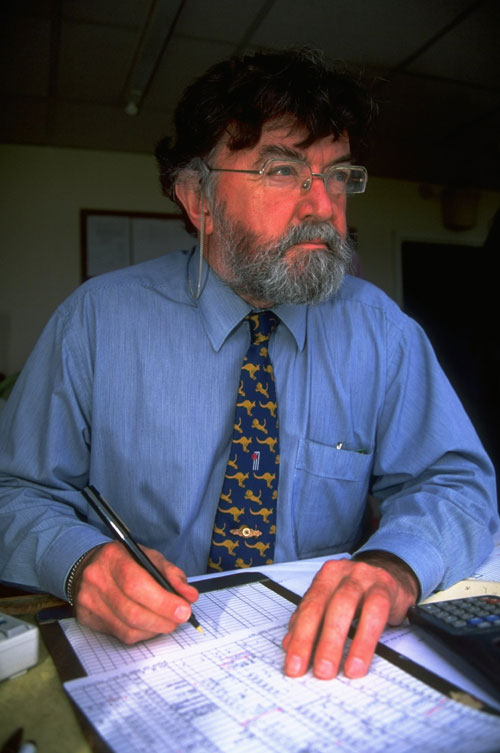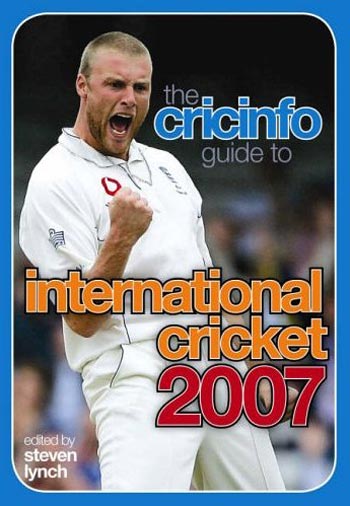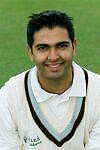What Bradman never knew
Peter Oborne
|
|

|
Steve Waugh and Keith Miller were two of the greatest Australian cricketers of all time. Each man embodied the national character. Yet they represent the two opposite principles which have driven Australian cricket forward for the last 150 years.
Waugh was determined to win at all costs. Miller played ferocious and competitive cricket, but he played for fun. Waugh never gave his wicket away. Miller often did. Waugh's ruthlessness was the secret of his team's success; he stood in a long and honourable line of Australian captains dating back through Allan Border to Don Bradman and beyond. Miller held out against this tradition.
Last year saw the very welcome publication of two important works that cast light on both men. In Keith Miller, Roland Perry skilfully draws out the tensions between Miller and Bradman. On the 1948 tour of England, Bradman focused on going through the Australians' 34 games undefeated, an objective which frankly bored Miller, who always preferred a close-fought contest to a walkover. Coming in at 364 for two against Essex, he deliberately missed a straight ball from Trevor Bailey to be bowled for a golden duck. Bradman remarked to Bailey: "He'll learn."
Bradman was not just wrong: he didn't get the point. Miller often gave his wicket away because he felt that others deserved a chance. He was the exact opposite of many bowlers, who find excuses when the pitch is flat, yet beg for the ball when conditions are helpful or tailenders are on the menu. He would be drawn into the fray by the prospect of a contest against the greatest batsmen yet, when they were gone, pass on his bowling duties to others. This meant that Miller's percentage of top-order wickets was exceptionally high. Likewise as a batsman, Miller was only interested in confronting the most testing opposition. Bradman had been formed as a man by the Bodyline series, when cricket really did for a short time seem like a matter of life and death. But Miller flew Mosquito fighter-bombers on long, perilous raids over wartime Germany. He saw death and destruction at first hand. Perry describes how on several occasions Miller's own life was preserved only by a near-miracle.
Part of the flair he brought to the game must have come from this experience. He was always aware that many of his friends had indeed paid the ultimate price for our freedom to play cricket on summer days. Perhaps more than any other Australian player, he made deep friendships with England players who shared his own outlook, such as Denis Compton. He liked winning, and he loved cricket. But he was always just as interested in other things: high society, women, horse racing. At his post-war peak, Miller was one of the most glamorous sportsmen on the planet.
But there was a price to pay. Perry brings out the sadness and seediness of Miller's later life. His family suffered terribly from the glamorous lifestyle and long absences from home. Three of his four sons became heroin addicts.
This was a bitter outcome for a man who seemed to have a perspective on what really mattered. Steve Waugh appears never to have forgotten - as Miller did - his duties as a father or made Miller's mistake of ignoring the huge sacrifice and contribution made by his family. Lynette Waugh herself contributes a chapter at the end of his autobiography, Out of My Comfort Zone, which may be a first.
This 800-pager describes how Waugh joined an enfeebled and poorly disciplined Australian side aged 20, and retired 18 years later with Australia acknowledged as the dominant team in the world. He played an essential part in that revival. Waugh's own record - 168 Tests, 57 as captain, 10,927 runs at an average of 51.06 - is awesome. It is yet more striking when one reflects that, as with his mentor Allan Border, many of those runs were scored in adversity.
This long book possesses all of the remorselessness of a Waugh double-century, though not the clarity of thought that distinguished his captaincy. Nevertheless, it is easy to read, an impressive achievement given that no ghost-writer seems to have been involved. Waugh's book, while not analytical, is full of insights, not least into England's lack of commitment during his era. His own guts, character and moral strength shine through.
Sixty Summers, by Peter Cox, sets out to provide a history of English cricket since the end of World War Two. His work, like very few sports books published today, is unabashedly aimed at grown-ups. It is based on deep learning and love of the game, and the judgments are sober and wise. His account of the wartime experiences of English cricketers is fascinating and important, but this is elegant and forward-looking analysis, not nostalgia. Each Test series is given separate space, but sharp studies of particular aspects of the game are the special joy of this scholarly volume.
|
|

|
Bill Frindall, the Test Match Special scorer, has produced a most enjoyable autobiography, Bearders. Frindall's previous existence was in the RAF, where he spent several years making contingency plans for the outbreak of World War Three. Frindall claims that this "proved to be excellent practice for my six- and seven-hour stints on Test Match Special". Had Armageddon come about, Frindall would doubtless have recorded every incoming and outgoing nuclear missile with copperplate precision and the odd wry comment.
Not even the RAF could entice young Frindall away from his destiny. The formative moment had come one afternoon at Tadworth Primary School when a teacher decided to teach his class of eight-year-old boys - which also included the future Surrey player Stewart Storey - the art of scoring. Frindall was hooked. He was a decent player in his own right and this book does not fail to include many past impressive bowling analyses.
The Captain Scott XI, founded by a group of Oxford undergraduates in the late 1970s, can now claim an important place in cricket literature. Ten years ago, Marcus Berkmann wrote Rain Men, a book about his life and times as a Captain Scott player. This minor masterpiece summed up the experience of playing cricket for the average individual of small ability but unlimited enthusiasm. Eventually, his friend Harry Thompson, the inventor of the TV programme Have I Got News For You, decided to follow suit.
Penguins Stopped Play is delightful, full of devotion to cricket and his fellow-cricketers. Every wandering player will recognise the Captain Scott XI: the difficulties of arranging tours, the internal rivalries, the desperate morning calls to rustle up extra players, the sharp conflict (unknown to professional teams) between the will to win and the need to make sure that everybody has a bat or a bowl... While writing the book, Harry Thompson fell ill. A day after discovering he had advanced lung cancer, he went in to bat for the Captain Scott XI, and saved the day, despite being in extreme pain and barely able to walk. It is very hard to read his account of this innings without crying. He died in November 2005, shortly after the book was finished. He was 45.
Cricket-lovers owe a debt to Stephen Chalke, who uses oral testimony to tell the story of cricketers who have given much to the game without ever quite becoming famous. His latest study is Ken Taylor of Yorkshire, England (three times) and Huddersfield Town, who is also a professional artist and teacher. This pleasantly unassuming book is illustrated by Taylor's own paintings. Chalke has also produced A Summer of Plenty, a very readable essay on the annus mirabilis of another Yorkshireman, George Hirst: 1906, when he uniquely scored 2,000 runs and took 200 wickets.
John Shawcroft's Local Heroes tells the story of Derbyshire's recovery from collapse in the immediate aftermath of World War One (they lost 17 games out of 18 in 1920, and the other was washed out) to their one County Championship, in 1936. Shawcroft shows how the Derbyshire team was mainly composed of products of the coalfields who worked hard, looked after each other and never accepted defeat. This is a work of passion, humanity and deep scholarship which does not merely deal with events on the cricket field, but roots the 1936 triumph in the Derbyshire mining communities and the economic circumstances of the time.
Paul Barry's unauthorised life of Shane Warne, Spun Out, will contain surprises for those who do not read tabloid newspapers. Its account of Warne's private life makes lively reading, but fails to explain the mystery of what created one of the greatest cricketers the world has known. Warne has also produced a picture book of his own, My Illustrated Career, which is not without a handful of shrewd observations. Scyld Berry has joined forces with Rupert Peploe, great-grandson of the Hon. Ivo Bligh, to produce Cricket's Burning Passion, an account of Bligh's 1882-83 mission to Australia to regain the Ashes, famously mislaid the previous summer. At the heart of this engaging study is Bligh's previously unseen diary, as well as hundreds of family letters.
Unlike so many cricketers, Peter Walker has a genuine story to tell in his well-written autobiography, It's Not Just Cricket, starting from the moment when, as an adventurous 16-year-old in South Africa, he ran away to sea. The boat docked in Wales, where Walker in due course returned to carve out a future as a Glamorgan and England cricketer. Brian Scovell's affectionate biography of Jim Laker, 19 for 90, marks the 50th anniversary of Laker's famous match and shows occasional signs of being hurriedly constructed. But it is full of useful information: Laker emerges as his own man, a difficult customer never afraid to take on authority.
Wisden itself offers more in the bookshops once again than just the almanack. Stephen Moss's Wisden Anthology 1978-2006: Cricket's Age of Revolution is an important and scholarly work, which can be read for pleasure and instruction for days on end. A literary as much as a cricketing achievement, the joy of this massive book is its detail and sensible judgment.
Gideon Haigh has edited a selection of the almanack's obituaries, entitled Peter the Lord's Cat. It is full of unexpected information: the scientist Victor Rothschild and the playwright Terence Rattigan put on 68 when opening the batting together for Harrow against Eton at Lord's in 1929; the novelist John Fowles and Trevor Bailey once cycled together to lessons at Alleyn Court Prep School; and the socialist leader H. M. Hyndman was a very useful batsman for Cambridge University and Sussex. "In later life many things of greater moment caused him far less disappointment" than his failure to win a university Blue. This small book is among other things a social history of Britain.
|
|

|
And a warm welcome must be extended to the inaugural Cricinfo Guide to International Cricket. It fills a yawning gap in the market by producing short profiles and career statistics for the top 200 players currently playing Test cricket. Even the visiting Sri Lankan or Bangladeshi squads should no longer hold mysteries to owners of this well-researched volume, which will surely become indispensable to both journalists and fans.
The post-Ashes deluge of England-related books has not entirely dried up. Andrew Strauss might come to regret writing an autobiography less than three years after his Test debut. But he shows enough with this level-headed volume, Coming into Play, to suggest that in due course he might well be capable of producing a worthwhile book.
The same cannot be said of his England colleague Kevin Pietersen, whose premature autobiography, Crossing the Boundary, for which Ebury Press paid a reported £300,000, is execrable. Pietersen demonstrates a primitive understanding of the complexities of post-apartheid South Africa: his assertion that he was forced out by racial quotas is at best dubious and at worst self-serving. It is hard to overstate the banality of the ghosted prose: at one point he informs the reader that "I like to buy the clothes I like." This book is a study in narcissism, and should be avoided at all costs by people who care about the game of cricket.
Two much better autobiographies have come out of Pakistan. That fine allrounder of a generation ago, Mushtaq Mohammad, has produced a work of charm and quality. There are at least two extraordinary facts about Mushtaq. The first concerns family: three brothers also played for Pakistan. They were forced to move from India after Partition and lived for many years inside a Hindu temple until better accommodation became available thanks to the cricketing success of elder brother Hanif. And supposedly Mushtaq played Test cricket aged just 15 years and 124 days, having played first-class cricket as a 13-year-old. These incredible statistics may indeed be incredible. "Although I believe I was born in November 1943, it is possible it was in November 1942," writes Mushtaq. "There is every chance those records were legitimate; there is also a chance they were not. My mother never had a birth certificate for me." Inside Out, well ghosted by Richard Sydenham, possesses a self-deprecatory humour rarely found in books of this type.
The other famous leg-spinning Mushtaq - Mushtaq Ahmed - had to put up with a great deal from the Pakistan team management and various captains he served under. His book, Twenty20 Vision, provides a withering analysis of the faults of Javed Miandad, Wasim Akram ("rude and critical of players in the field, even if they were giving him everything they had"), and others. Only Imran Khan (who wrote the foreword) is exempt from criticism.
At the heart of this book is the moral and emotional collapse which Mushtaq Ahmed seems to have suffered while playing for Somerset. He found his way out of his personal morass by wholeheartedly embracing Islam. His account of what Islam means to him is extremely moving, and its importance stretches beyond cricket. His journey is about love and forgiveness.
|
|

|
Most books by sportsmen are written by those who have triumphed at their chosen discipline. Wasim Khan's autobiography, Brim Full of Passion, deals with failure. It tells the story of how, as a Birmingham-born Pakistani, he broke into the Warwickshire team when it was at its peak in the early 1990s and came close to establishing himself as an outstanding county cricketer. A series of factors - bad luck, personality clashes, injury, lack of opportunity - held him back. Eventually, after an unhappy move to Sussex, he was forced to give up the first-class game.
It may not be an atypical story and, as such, conveys the quiet despair of the struggling county pro. It reminds the reader that there is often far more turmoil and drama going on in the head of the unknown young cricketer trying to keep his place than in the big name striding confidently to the wicket. Wasim Khan's book, well ghosted by Alan Wilkinson and produced by a publishing house in Derby, also provides a rare account of what it is like to be a young Pakistani growing up in a deprived area of Birmingham. Wasim pays tribute to Pete Bolland, the PE teacher at Oldknow School, who steered him towards the first-class game. And the wonderful thing about him is that throughout he retained his enthusiasm. He turned to coaching, discovered rare gifts, and is now director of operations with the Cricket Foundation, which runs the Chance to Shine initiative and is striving to regenerate cricket in state schools. This unusual and challenging book tells difficult truths ignored in more conventional works. Brim Full of Passion is Wisden's book of the year.
Peter Oborne is the author of a biography of Basil D'Oliveira and captains the White City All-Stars CC, a wandering team. In his spare time, he covers politics for the Daily Mail, The Spectator and Channel 4.
Wisden's Book of the Year
Since 2003, Wisden's reviewer has selected a Book of the Year. The winners have been:
2003 Bodyline Autopsy by David Frith
2004 No Coward Soul by Stephen Chalke and Derek Hodgson
2005 On and Off the Field by Ed Smith
2006 Ashes 2005 by Gideon Haigh
2007 Brim Full of Passion by Wasim Khan

